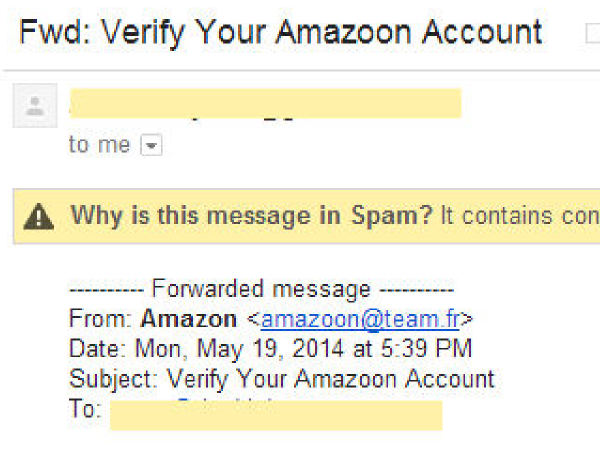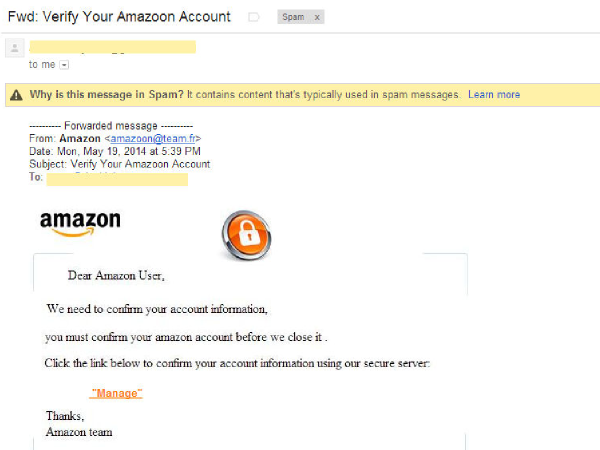Don't Fall for the 'Amazoon' Phishing Scam
Fraudulent emails from 'Amazoon' are the most laughably halfhearted phishing scam we've seen in a while. Don't fall for them.


It's the most halfhearted phishing attempt we've seen in a while: Security company Malwarebytes has identified a new email scam trying to trick recipients into divulging the credentials to their "Amazoon" accounts.
Yes, you read that right. The email message comes from the address "amazoon [at] team [dot] fr" and the subject line reads "Verify Your Amazoon Account." The body of the message contains an Amazon logo and vaguely worded instructions to "confirm your account" by clicking on the hyperlinked word "Manage."
MORE: Best Antivirus Software 2014
When cybercriminals steal someone's financial information or hijack an account, they're not usually "hacking." More often, they'll simply try to trick authorized users into divulging their own account-login credentials.
Usually, however, criminals try a little harder than this. Even without the obvious spelling mistake, these "Amazoon" emails contain all the phishing warning signs: the request to "confirm an account" for an unspecified reason, a vague threat that an account is about to be closed, again for an unspecified reason, an incorrect email address domain name (in this case, team.fr instead of amazon.com) and an embedded hyperlink that seems like it should lead to Amazon's website.
Malwarebytes found that this link redirects to a fraudulent Web page that does a much better job of pretending to be the real Amazon. If you enter your Amazon-associated email address and password, you'll then be taken to a page claiming to ask for "Billing Address Verification": your full name, home address and phone number.
The page after that is no longer accessible. Malwarebytes' Christopher Boyd says that may be because the website's host took it down. He guesses the removed page probably asked users to share credit-card information.
Sign up to get the BEST of Tom's Guide direct to your inbox.
Get instant access to breaking news, the hottest reviews, great deals and helpful tips.
You should always be very skeptical of unsolicited email messages, particularly those that seem to come from online services. Double-check the email addresses from which the messages were sent, and don't trust anything official that has spelling mistakes in it.
If you ever really need to check up on an online account, you should go to that webpage yourself by typing the URL into your browser, instead of clicking any links in emails.
Email jscharr@techmedianetwork.com or follow her @JillScharr and Google+. Follow us@TomsGuide, on Facebook and on Google+.
Jill Scharr is a creative writer and narrative designer in the videogame industry. She's currently Project Lead Writer at the games studio Harebrained Schemes, and has also worked at Bungie. Prior to that she worked as a Staff Writer for Tom's Guide, covering video games, online security, 3D printing and tech innovation among many subjects.
-
dstarr3 It's only a threat because it works on some people. Some people that should have their internet privileges revoked.Reply -
realibrad My friend billy bob now makes $$$$1/hr from home, and you can too, but only if you know how to swoon the ladies.Reply
The people that fall for that email will fall for my comment -
jhelson I clicked on the "Manage" link in the picture in your article, but it didn't work. Please help me confirm my account before it is closed! I don't want to lose my Amazoon Priime status!Reply -
mbwoods ReplyI clicked on the "Manage" link in the picture in your article, but it didn't work. Please help me confirm my account before it is closed! I don't want to lose my Amazoon Priime status!
you are the biggest idiot on this planet thinking its an actual webpage when its a picture of a webpage. go to the proper amazon.com webpage and check your account there -
BrenzyEx ReplyI clicked on the "Manage" link in the picture in your article, but it didn't work. Please help me confirm my account before it is closed! I don't want to lose my Amazoon Priime status!
you are the biggest idiot on this planet thinking its an actual webpage when its a picture of a webpage. go to the proper amazon.com
webpage and check your account there
You're the biggest idiot for falling for an obvious troll.
-
virtualban Reply
I call that sarcasm, not trolling. I found that fun.I clicked on the "Manage" link in the picture in your article, but it didn't work. Please help me confirm my account before it is closed! I don't want to lose my Amazoon Priime status!
you are the biggest idiot on this planet thinking its an actual webpage when its a picture of a webpage. go to the proper amazon.com
webpage and check your account there
You're the biggest idiot for falling for an obvious troll. -
HarrietPurtonmik The Green Coffee Beans is characterized by strong antioxidant properties, which in turn improves the performance of the cardiovascular system, because unlike the coffee extract of green coffee beans containing caffeine and reduce stress. At the moment this is only a scientific hypothesis whose confirmation as soon as we publish appears on scientific sources. for more information please visit .................Reply
http://www.buygreencoffeebeans.org -
Commander Jameson I tried to buy Green Coffee Beans to stop my Amazoon Account from being closed, but it Didn't work! My stress levels were not reduced, although that is only a creationist hypothesis!Reply
